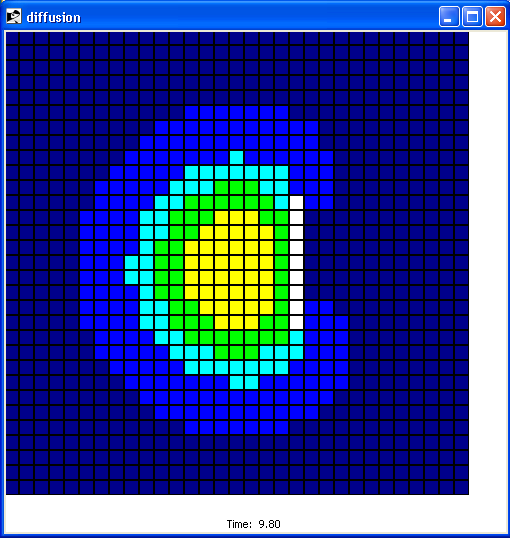Solving a 2D diffusion problem with the Tensor package
Arjen Markus (15 december 2010) The program below solves a 2D diffusion problem using the Tensor package. It is not quite complete yet (the "wall" is done in the wrong way, but I was too lazy to do it correctly) but it does illustrate the potential of the package.
(Note to self: more experiments - a problem with spherical symmetry, one with non-linear boundary conditions and an N-body problem to explore the facilities that the Tensor package offers)
# diffusion.tcl --
# Solve a two-dimensional diffusion problem:
# - An initial condition consisting of 1.0 in four grid cells
# - Zero concentration on the boundaries
# - Constant diffusion
#
# A small twist: there is an inner boundary that hinders
# diffusion, though it is modelled too simply. I should
# suppress the diffusion on the sides on the grid cells
# rather than suppress the change in the grid cells.
# Visually the effect is very similar.
#
package require Tk
lappend auto_path .
package require Tensor
# nextTime --
# Compute the result for the next time
#
# Arguments:
# None
#
# Side effects:
# Tensor u updated (du is an auxiliary tensor)
#
proc nextTime {} {
set ucoeff [expr {$::diffusion * $::deltt / (2.0*$::deltx**2)}]
set end [expr {$::number}]
set endm1 [expr {$::number-1}]
set endp1 [expr {$::number+1}]
#
# Bounds depend on the type of boundary condition - unfortunately
#
::tensor::expr "du(i=1:$end,j=1:$end) = 4.0*u(i=1:$end,j=1:$end) - u(i=0:$endm1,j=1:$end) - u(i=2:$endp1,j=1:$end)
- u(i=1:$end,j=0:$endm1) - u(i=1:$end,j=2:$endp1)"
du *= tensor mask
::tensor::expr "u(i=1:$end,j=1:$end) = u(i=1:$end,j=1:$end) - $ucoeff * du(i=1:$end,j=1:$end)"
}
# setBoundaryConditions --
# Set the boundary conditions - almost trivial in this case
#
# Arguments:
# time Time in the computation
#
# Side effects:
# Tensor u is updated
#
proc setBoundaryConditions {time} {
set end $::number
u section [list 0 [list 0 $end]] = scalar 0.0
u section [list $end [list 0 $end]] = scalar 0.0
u section [list [list 0 $end] 0 ] = scalar 0.0
u section [list [list 0 $end] $end ] = scalar 0.0
}
# initialisePlot --
# Initialise the plot
#
# Arguments:
# None
#
# Side effects:
# Graph is updated
#
proc initialisePlot {} {
set width [.c cget -width]
set height [.c cget -height]
set wrect [expr {$width / ($::number+2)}]
set hrect [expr {$height / ($::number+2)}]
for { set j 0 } { $j < $::number+1 } { incr j } {
for { set i 0 } { $i < $::number+1 } { incr i } {
set xl [expr { $i * $wrect }]
set xr [expr { $xl + $wrect - 1}]
set yu [expr { $j * $wrect }]
set yd [expr { $yu + $wrect - 1}]
set id [.c create rectangle $xl $yu $xr $yd -fill white]
cell section [list $i $j] = scalar $id
}
}
.c create text [expr {$width/2}] $height -text "Time: 0.0" -anchor s -tag time
}
# plotData --
# Plot the result
#
# Arguments:
# time Time in the computation
# values List of values
#
# Side effects:
# Graph is updated
#
proc plotData {time} {
set colours [list darkblue blue cyan green yellow orange red]
set values [list 0.0001 0.003 0.01 0.03 0.1 0.2 0.5]
.c itemconfigure time -text "Time: [format "%5.2f" $time]"
for { set j 0 } { $j < $::number+1 } { incr j } {
for { set i 0 } { $i < $::number+1 } { incr i } {
set id [cell section [list $i $j]]
set value [u section [list $i $j]]
set active [mask section [list $i $j]]
if { $active == 0.0 } {
continue
}
foreach v $values c $colours {
if { $value <= $v } {
break
}
}
.c itemconfigure $id -fill $c
}
}
after 100 {
set go 1
}
vwait go
}
# main --
# Create the tensors, store a few
# computational paramters and then
# run the time loop
#
set diffusion 0.1
set number 30
set length 10.0
set deltx [expr {$length/$number}]
set deltt 0.001
set size [expr {$number + 2}]
tensor::create u -size [list $size $size] -type double
tensor::create du -size [list $size $size] -type double
tensor::create cell -size [list $size $size] -type int
tensor::create mask -size [list $size $size] -type double
#
# Initial condition
#
u = scalar 0.0
du = scalar 0.0
set mid [expr {$number/2}]
u section [list [list $mid [expr {$mid+1}]] [list $mid [expr {$mid+1}]]] = scalar 1.0
#
# Set several cells to inactive
#
mask = scalar 1.0
set inactiveRow [expr {$mid + 4}]
mask section [list $inactiveRow [list [expr {$mid - 4}] [expr {$mid + 4}]]] = scalar 0.0
#
# Loop over time
#
pack [canvas .c -bg white -width 500 -height 500]
tkwait visibility .c
initialisePlot
set t 0
while { $t < 100000} {
set time [expr {$deltt * $t}]
if { $t % 200 == 0 } {
plotData $time
}
setBoundaryConditions $time
nextTime
incr t
}
And here is a screenshot - the white bar is the wall that hinders the diffusion:
